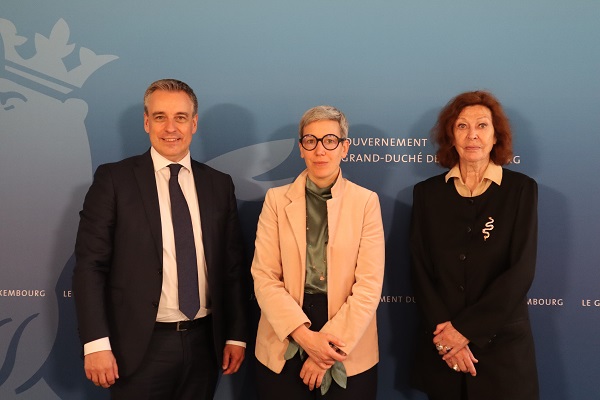 L-R: Claude Meisch, Luxembourg's Minister of Education, Children & Youth; Sam Tanson, Luxembourg's Minister of Justice; Renate Winter, international children's rights expert;
Credit: MJUST
L-R: Claude Meisch, Luxembourg's Minister of Education, Children & Youth; Sam Tanson, Luxembourg's Minister of Justice; Renate Winter, international children's rights expert;
Credit: MJUST
On Tuesday 29 March 2022, Luxembourg's Minister of Justice, Sam Tanson, and the Minister of Education, Children and Youth, Claude Meisch, presented the new criminal law for minors in Luxembourg.
The reform of youth protection and with it the separation between the aspects of youth protection and criminal law for minors materialise certain elements of the 2018-23 coalition agreement and honour a commitment made in 2019 by Luxembourg in the context of the United Nations (UN) Committee on the Rights of the Child.
Minister Meisch stressed that "by separating youth protection and criminal law for minors, Luxembourg is not only respecting an international obligation. The National Office for Children is also seeing its mission take a more prevention-oriented direction".
The National Children's Office (Office National de l'Enfance - ONE) is an administration which is part of Luxembourg's Ministry of Education, Children and Youth. It provides assistance to children and young adults in distress and their families.
The new law strengthens ONE and extends its powers to education and prevention. Through its holistic approach to caring for the whole family, this body will henceforth consider the family as an equal partner and will support it both in the planning and in the implementation of aid measures.
ONE has also been strengthened in the support it provides to volunteer families and in its prevention mission: it will be able to intervene before a problem arises and support parents in their role as educators.
An alternative to the current reporting practice is also in place. This will facilitate rapid referral to the competent service and make it possible to offer assistance adapted to the diversity of situations, as soon as possible.
Together with service providers, ONE will conduct a collaborative and participatory approach to develop quality in the sector based on the reference framework for child and family assistance. The focus on the concept of youth and child protection is an integral part of the quality approach.
The new law also strengthens the role of foster families as providers of child and family assistance with the regularisation of their status, including the possibility of choosing independent status.
Within the framework of the judicial procedure, the procedural guarantees have been reinforced. Thus, the minor is obligatorily assisted by a lawyer and his / her right to be heard is reaffirmed. As far as possible, the minor must be kept in his / her family environment. The parents retain parental authority and the service provider responsible for carrying out the reception measures will have the right to perform the usual acts under parental authority.
A third bill aims to strengthen the rights of minors who are victims or witnesses of criminal offences.
The bills in question are the result of consultations with Renate Winter, an international expert on children's rights and former president of the UN Committee on the Rights of the Child.
The bill introducing criminal law for minors establishes a criminal procedure adapted to the needs and particular vulnerability of minors who have reached the age of criminal responsibility, which is set at fourteen years. To this end, the bill provides for the principle of application of the Criminal Code and the Code of Criminal Procedure, while setting out derogatory provisions better suited to minors. It pursues an educational and rehabilitative objective, the deprivation of liberty of the minor being the last resort and being strictly supervised and limited. It is also part of a logic of diversion, while it gives priority to diversionary measures, aimed at offering minors who have committed a minor offence an alternative to penal sanctions. The minor may, with his / her agreement, be subject to a measure within the framework of which he / she is led to carry out a positive action which will further contribute to his / her accountability, such as an educational service of general interest.
Due to the creation of a real criminal law for minors, structural changes are also required. Jurisdictions exclusively competent in matters of criminal law for minors will be created. At the same time, the creation of new structures and new services in the field of criminal law for minors, in particular at the level of the Central Social Assistance Service (Service central d'assistance sociale - SCAS) of the Public Prosecutor's Office, is planned.
Moreover, the bill provides enhanced procedural safeguards for minors prosecuted for a criminal offence. The accompaniment of the minor by his / her legal representatives as well as assistance by a lawyer during the penal procedure are guaranteed, in particular.
The rights and procedural guarantees of minors who are victims or witnesses of criminal offences are also strengthened, in particular through measures to guarantee protection and adequate monitoring of the minor, not only by specialised professionals, but also by a trust that the minor can designate in order to support him / her during the criminal procedure.








